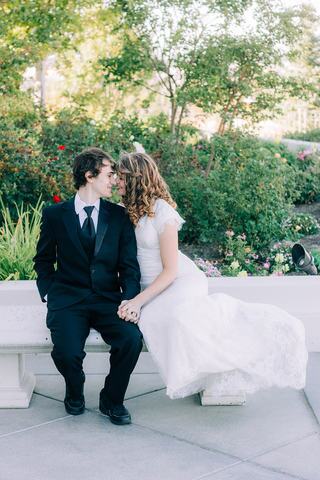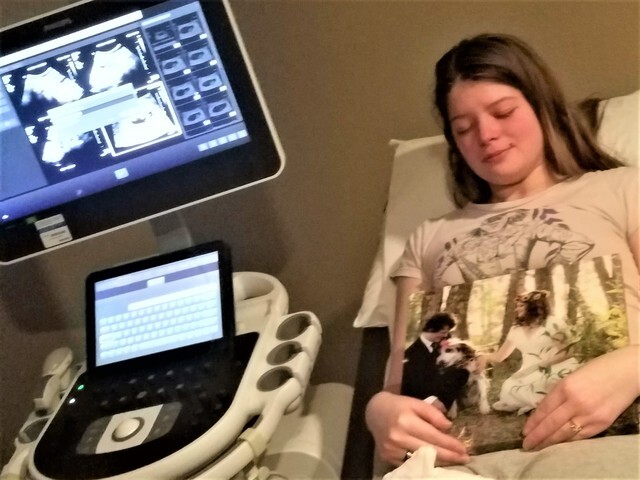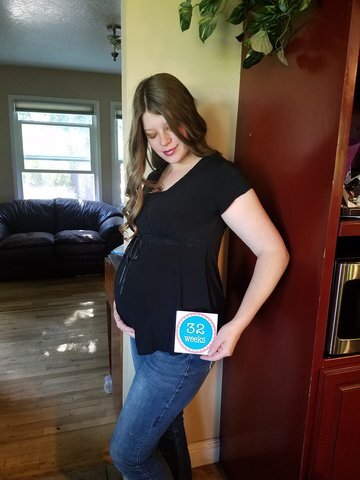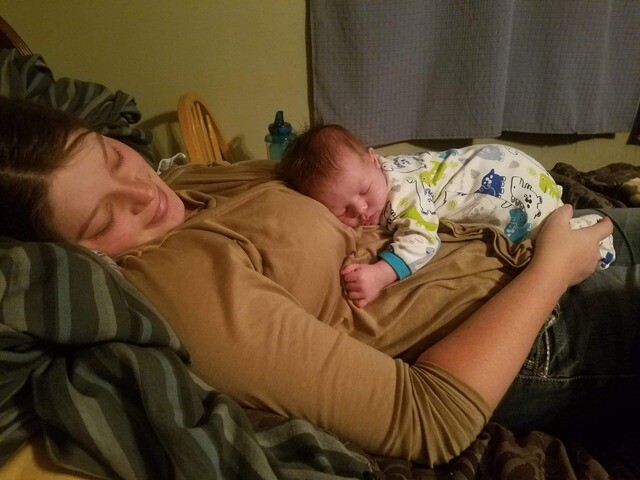Kyra* knew something was wrong as soon as she turned on the lights and saw her husband, lying still in bed. “That moment is forever ingrained in my head, seeing that he just didn’t look right, that he wasn’t there. Something was wrong,” she says. “There are no words to describe that moment.”
A Fairytale Gone Wrong
Kyra had just turned 21 years old. She and her husband, Jacob, had bought their first home two months prior, and after a prompting to begin their family earlier than planned, on Christmas day the couple had discovered Kyra was pregnant.
“Everything was exactly the way it should be. Our life was starting the way we wanted it to, we had our dream house that we were going to raise our kids in—we knew exactly what we wanted and where we were going,” Kyra said.

But on January 11, 2018, when Kyra tried to wake up Jacob, he was unresponsive. After her initial panic, Kyra’s medical emergency training kicked into gear.
Kyra started CPR and called 911. She was put on hold for two and a half minutes before finally speaking with an operator—who then put her on hold again before she finally got through to someone who could help her. She performed CPR for 20 minutes while waiting for the ambulance to arrive.
Kyra recalls, “I felt if I just focus then everything will be OK.” Because of that focus and the shock that naturally comes with such an unexpected tragedy, when the ambulance arrived, Kyra was able to calmly pack a hospital bag with her and Jacob’s clothes, put their dog in the kennel, call their families to meet them at the hospital, and then move to the front seat of the ambulance.
“Someone got in the front seat with me and said, ‘Are you OK? How are you feeling? Are you going to throw up?’ My brain was so turned off at that point, but the thought went through my head, ‘There’s something I need to remember. Oh, I’m pregnant,’” Kyra says. “That was the moment I [thought]: ‘I am pregnant, and my husband is dead in the back of this ambulance.’”

At the hospital, the doctors determined that Jacob had experienced a massive silent seizure and Jacob was put on life support. Kyra spent every waking moment she could at his bedside, holding his hand. She remembered thinking to herself, “This is it. This is where my life ends. Not just his, but mine. This is the end of everything I have.”
Three days after Jacob’s life-shattering seizure, Kyra stood at his bedside with both of their families and heard the doctor say “1:18”—time of death. She kissed her husband on the forehead and squeezed his hand.
Jacob never returned to his and his wife’s dream home, and neither did Kyra.
Starting Over
“One of the things that happened in the hospital that kept playing in my memory over and over again was my mom saying, ‘Wow. You’re a widow,’” Kyra says. “That was old ladies! No one thinks it’s going to happen to them, but I really didn’t think it was going to happen. I was 21 years old, for heaven’s sake!”
On top of being a young widow, Kyra was now six weeks pregnant, meaning that when she announced her husband’s death on Facebook, she also announced her pregnancy. In fact, she played her baby’s heartbeat at the funeral because, she says, “he was so excited to be a dad.”

Kyra takes a photograph of her and Jacob from their wedding to an ultrasound.
While Kyra grappled with the new reality of being a widow and expectant mother, others rose to help her with the transition into her drastically new life.
For example, while still in the hospital with Jacob, Kyra’s ward packed and cleaned her entire house, readying it for new renters. Meanwhile, members from Kyra’s home ward brought her belongings to her childhood home, cleaned out her old bedroom, painted it, hung curtains, installed shelves, and decorated with photos. They stayed up all night so that the room was completely ready for Kyra to move in to when she came back from the hospital.
President Henry B. Eyring has said, “That miracle of quiet courage and charity—the pure love of Christ—has been repeated over the years and across the world” (Henry B. Eyring, “Fear Not to Do Good,” Ensign or Liahona, Nov. 2017). Such quiet courage and charity echoed in the countless acts of service towards Kyra and her family.
“The number of meals that came in—we didn’t have enough room in our fridge for it,” Kyra says. “I remember one of the ladies in my ward, Sister (Sandy) Hansen, bringing me homemade bread and a buttered slice, and that was all I ate for a while. She still brings it to me every once in a while, and it is such a special thing.”
Kyra received tremendous support from friends and family willing to minister to her in her grief. The following days after Jacob’s death, Kyra’s parents and best friend alternated sitting in her room’s rocking chair and watching over Kyra while she slept or lay in bed crying. Ward members made a special effort to reach out to Kyra. One sister, Emilia Temple-Wheeler, even brought over eight different pints of ice cream, saying, “Want to try ice cream with me today?” It was those unique, thoughtful acts of service that Kyra remembers the most.
Difficult Reactions
Though Kyra appreciated every attempt and form of support she was offered, not everyone knew how to respond to her tragedy. Many of her and Jacob’s “couple” friends faded out of contact, and at church some ward members avoided Kyra, afraid or unsure of what to say. Often, people tiptoed around the subject of Jacob, as if afraid of reminding her that Jacob had died.
“No one is going to remind you that they died—you already know they died! That’s your life. And so people are afraid to use their name—people are afraid to talk about him—but sitting down and having a conversation with somebody about their spouse and letting them tell their stories and letting them tell you their story of being widowed is immensely helpful,” Kyra says.
Kyra also struggled with incessantly hearing, “You’re so strong” or “I don’t know how you do it.” While she knew these comments were well-intentioned, Kyra often thought, “I don’t need to be told I’m strong. I need a friend.” Other times, people cut off conversations quickly and then said, “Call me if you need anything, and I’ll be there!”—not realizing that their opportunity to be there for Kyra was right then.
Kyra yearned most for those who were willing to “be there.” But even then, the loneliness was sometimes near all-encompassing, even though she recognized the love and support of those around her.
“Your best friend is gone. You’re so alone. You are at the deepest caverns of the ocean and you are out of air. Even if I had hundreds of people around to support me, there’s something weird about [going from] being somebody’s everything . . . to being second choice for everybody,” she says.
However, she knew it’s not always easy “mourning with those that mourn . . . and comforting those that stand in need of comfort” (Mosiah 18:9).
“To mourn with those that mourn is a much harder thing than the way Jesus makes it sound. People who are grieving—who are mourning—in the moment they don’t even care that you are there. They might say things they don’t mean. Sometimes people who are grieving can be mean,” Kyra says. “But they will remember later that you were there, and that will mean a lot to them.”
Still, deep down, Kyra always knew she wasn’t alone—and that she was someone’s priority—Heavenly Father and Jesus Christ’s. She was regularly reminded of the quote from Elder Dieter F. Uchtdorf given at the last conference she and Jacob spent together: “If you have faltered, failed, feel broken, bitter, betrayed, or beaten—know that you are not alone. God still calls to you” (Dieter F. Uchtdorf, “A Yearning from Home,” Ensign or Liahona, Oct. 2017).
Coping with Humor
Kyra found strength in a favorite quote from Marjorie Pay Hinckley: “The only way to get through life is to laugh your way through it. You either have to laugh or cry. I prefer to laugh. Crying gives me a headache.”
Kyra cried a lot—but she laughed a lot, too. Humor was a major coping mechanism for her.
“Even though it’s a dark thing that you’re not supposed to joke about, sometimes humor is the only thing that can get you through it,” Kyra said.
Kyra jokes that her life feels like a dark sitcom at times. For example, the last day Jacob was alive, Kyra and Jacob discovered that their marriage license wasn’t on file in the county, so they had to refile the documents. A natural result of filing a marriage license is that the paper prints a marriage announcement—which just so happened to run in the same paper as Jacob’s obituary. The head of the newspaper called and profusely apologized and offered to fix it somehow, but all Kyra could do was laugh and reply, “Too late now!”

In another instance, Kyra and her mother were at her brother’s friend’s graduation party. A mother at the party was worried about her rebellious teenager, but said that she’d heard that the hardest teenagers often became the best adults. In defense of well-behaved teenagers, Kyra had said, “Well, I don’t know. I was a pretty good teenager and I think I turned out OK, too.” Kyra’s mother, knowing how Kyra liked to laugh, jokingly listed off reasons countering Kyra’s claim: “Uh huh, pregnant, not married, living at home. . . .”
“At this point, people in the room just started to look at us. And then my mom looked up and realized people were staring at her and she said, ‘Uh . . . it’s OK! Her husband is dead!’” Kyra recalls, laughing. She and her mother left the party shortly after.
The Unexpected Journey

Kyra’s life is drastically different now than it was a year ago. Though she struggled to eat and sleep the months following Jacob’s death, Kyra gave birth to a healthy baby boy, whom she named Alexander “Xander” Jacob—a name she and Jacob had picked out together. She has found a support system in other widows and widowers, new friends, and family. Most importantly, she’s hopeful about her future.
“When you’re on life’s track and your train suddenly turns to another direction than where you were going to go, you have to learn to adjust with that,” Kyra says. “Every day you have to tell yourself, ‘I am going to be OK. I am going to enjoy the blessings that this has brought to me.’ I am going to think, ‘You know, this is not the path that I intended my life to be, this isn’t where I was going, but at the same time I have to enjoy the new places I am going. Maybe this track isn’t going through the perfect scenic vista that I had intended for it—it’s going through some different places—but they’re pretty places too.’
“It’s like if you were planning on going on a trip to the beach and end up in a rainforest instead. It’s still pretty, it’s just not the one you intended. And sometimes in that rainforest, there are some dark places, but you can still learn to appreciate the brighter things there.”
*Last name withheld

